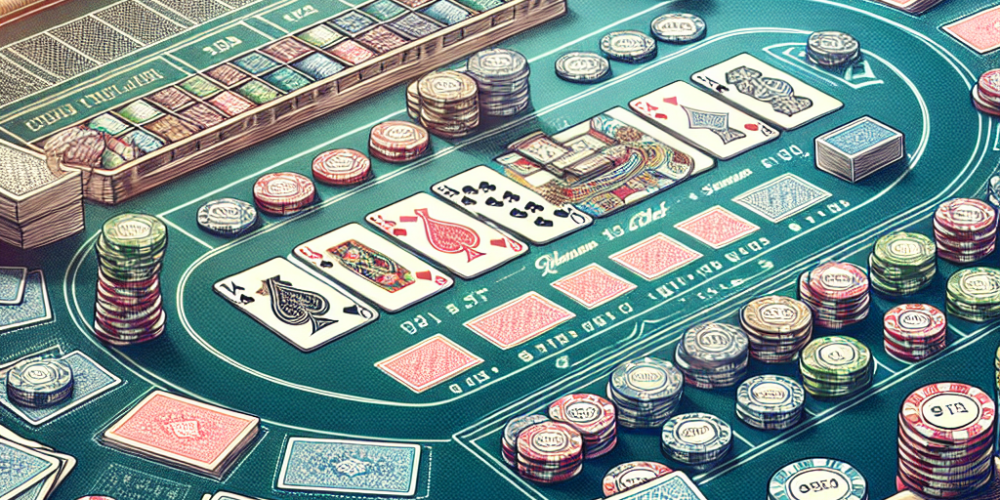One of the most common mistakes in Pai Gow Poker is playing too aggressively with the two-card hand, often referred to as the “front hand” or “top hand.” Many players focus on creating a strong five-card “bottom” hand, undermining their overall strategy. A balanced approach aimed at winning both hands or pushing (tying) can significantly enhance your overall odds.
Understanding Pai Gow Poker
Pai Gow Poker combines elements of ancient Chinese Pai Gow and classic American poker. The game is played with a standard 52-card deck plus one joker, which can act as an ace or complete a straight, flush, or straight flush. Players receive seven cards and must split these into two hands: one five-card hand and one two-card hand. The five-card hand must be stronger than the two-card hand. Winning both hands against the dealer is the primary goal.
Mastering Hand Splitting
Effectively splitting your seven cards is crucial. Always aim for a reasonably strong two-card hand while ensuring your five-card hand remains superior. For example, if dealt three pairs, place the highest pair in the two-card hand. This increases your chances of winning or pushing both hands against the dealer.
Utilizing the Joker Wisely
The joker adds a unique twist. Use it to turn a potential losing hand into a powerhouse or salvage a disjointed set of cards into a decent flush or straight. Strategic use of the joker can dramatically shift the odds in your favor.
Strategic Decisions in Pai Gow Poker
Pai Gow Poker requires a deep understanding of both traditional poker hand rankings and strategic division between hands.
When to Split Pairs
Deciding when and how to split pairs can be challenging. Conventional wisdom suggests keeping them together in the five-card hand unless you have a second pair or a strong side card to support a standalone two-card hand. If you have two high pairs (e.g., queens and aces), consider splitting them, placing the lower pair in the front to secure a win there.
Handling Full Houses
When dealt a full house, always split it unless you can place a pair higher than tens in the front while keeping three of a kind in the back. This not only balances the strength between the hands but also increases the chances of pushing the round.
Bankroll Management in Pai Gow Poker
Maintaining a healthy bankroll is essential in Pai Gow Poker, given its frequent pushes, which can mean prolonged play without a significant win or loss.
Setting a Budget
Decide on a loss limit and a win goal before you start playing. This will help you keep your finances in check and prevent chasing losses or gambling winnings away. It’s advisable to have enough funds to play at least 30 hands to account for the game’s variability.
Betting Strategy
Consider using a conservative betting strategy. Given the high frequency of ties, employing a flat betting strategy (betting the same amount on each hand) can help manage your bankroll effectively. Increase your bets only after significant wins and revert to the original bet size after a loss.
Increasing Winning Chances
While Pai Gow Poker is a game of chance, several techniques can tilt the odds slightly more in your favor.
The Importance of the Dealer’s Position
Pay close attention to the dealer’s hand in each round. Since the dealer has to follow the house way of arranging the hands, experienced players can predict the dealer’s setup and adjust their strategy accordingly to secure an edge.
Opting for the Banker Role
Whenever possible, take the opportunity to bank. When you bank, you’re playing against other players, not the house, which slightly improves your winning odds, as the house edge is lower against individual players.
Key Takeaways for Pai Gow Enthusiasts
Pai Gow Poker offers a refreshing blend of strategy and pace. Remember to:
– Balance your two hands to maximize overall effectiveness.
– Make educated decisions on splitting pairs and handling complex hands like full houses.
– Manage your bankroll with a cautious approach to betting.
– Observe the dealer’s strategy and opt to bank when feasible.
By integrating these strategies, you can enjoy extended play and potentially increase your Pai Gow Poker success. Remember, the goal is often to push and stay in the game, setting up opportunities for more significant wins.

David Harrison stands tall in gambling journalism, marrying his firsthand casino experiences with a deep understanding of betting psychology. His articles transform complex gambling jargon into engaging tales of strategy and chance, making the world of betting accessible and enjoyable. David’s knack for narrative extends beyond print, making him a sought-after speaker on gambling trends and future bets. In the realm of gambling, David is both a scholar and a storyteller, captivating readers and listeners alike.
















